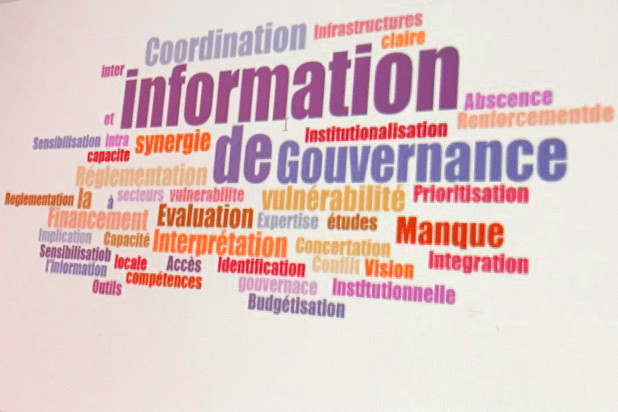27 September 2017 – What is the process to formulate and implement National Adaptation Plans (NAPs)? How can it be used to reduce Morocco’s vulnerability to climate change and integrate climate change adaptation into ongoing development planning processes? How can decision makers include the gender lens to build more inclusive and more effective initiatives? What does Morocco’s current road map for conducting its NAP process look like, and how can it be further enhanced for effective delivery?
These were just some of the questions discussed at a workshop held in Marrakesh, 17-20 April 2017. The workshop was co-hosted by GIZ, UNDP and UNITAR, and supported through the GIZ Environment and Climate Governance project, and aimed at developing and strengthening the technical expertise of Morocco climate action focal points from several departments, including: the Secretariat of State for Sustainable Development, the Ministry of Equipment, Transport and Logistics, the Ministry of Country and Urban Planning, Habitat and City Policy, the Ministry of Economy and Finance, and several specialized agencies. Thirty-five participants attended.
Interactive discussions were encouraged as the workshop included a mix of introductory presentations by GIZ, UNDP, UNITAR and independent experts, country-specific presentations and discussions, and group exercises.
The elements and indicative steps and activities of the NAP process as defined in the UNFCCC/LEG guidelines were introduced. UNDP walked participants through the steps that could be followed to integrate climate change adaptation into development plans and processes, including budgets, and highlighted the opportunity to align the 2030 development agenda and the NAP process.
Khadija El Houdi from the Morocco High Planning Commission presented the outcome of the Millennium Development Goals in Morocco and explained how the Kingdom is now addressing the 2030 development agenda and the Sustainable Development Goals (SDGs).
In relation to the country’s National Adaptation Plan, Houdi underscored the need to guarantee access to reliable energy (SDG9), promote sustainable economic growth (SDG 8), build climate-resilient infrastructure (SDG 9), reduce inequalities and protect climate resilient lives and livelihoods (SDGs 10 and 11). She also mentioned the need to secure peace and forge partnerships (SDGs 16 and 17).
In complement, Ms. Naima Oumoussa from the Secretary of State for Sustainable Development presented Morocco’s Sustainable Development Strategy finalized in 2016. She described one of the core objectives concerned with accelerating the implementation of the national climate change policy. She further identified gaps to be addressed to fully anchor the NAP process in this strategy. At the regional level, efforts to integrate adaptation in local development planning are underway, in particular in the regions of Sous Massa and Béni Mellal Khénifra. In Sous Massa, good practices are being documented and guides and tools are developed to strengthen capacities.
A session was also dedicated to approaches to gender equality in adaptation planning. The presenter, Sepideh Lahabani, recalled Article 19 of Morocco’s Constitution “The man and the woman enjoy, in equality, the rights and freedoms of civil, political, economic, social, cultural and environmental character, enounced in this Title and in the other provisions of the Constitution […]’ and further outlined five success factors for gender mainstreaming: political will, awareness raising and training, availability of sex disaggregated data, provision of financial and human resources, and active stakeholders engagement. She then gave specific recommendations for the NAP process along these success factors.
A substantive amount of time was dedicated to reviewing Morocco´s initial road map for the NAP process, which was developed in October 2016. During the workshop, participants also set up working groups with defined terms of reference to work on various elements of the road map. The revised road map presented as an output of the workshop, is structured around four strategic objectives, namely:
- Strategic objective 1: Identifying climate information (climate and socio-economic data), vulnerabilities and impact, and managing gaps for improved assessment
- Strategic objective 2: Evaluating and improving skills and identifying current opportunities for the integration of climate change adaptation into development planning processes at different levels, including sectoral and regional planning processes
- Strategic objective 3: Enhancing national and regional capacities to integrate climate change adaptation in key national and regional development, planning and regulatory processes
- Strategic objective 4: Develop a strategy for the implementation and financing of the NAP process
PowerPoint Presentations
Day 1
Day 2
Session 6 - Analyse bénéfice coûts
Session 7- le cadre stratégique du développement au maroc
Intégration sectorielle de l'acc au maroc
Session 6- mesures d'adaptation
Session 7- integration sectorielle
Day 3
Session 9 - présentation atelier planification genre climat
Session 10 - système de suivi et d'évaluation
Session 10 - mise en oeuvre et financement
Processus pna présentation de la feuille de route atelier points focaux
Regional work see ac-béni mellal
Photos
Read the French version.

